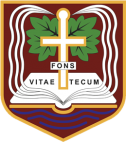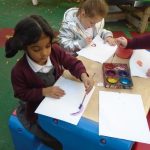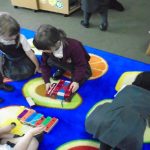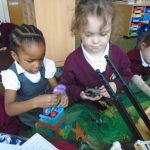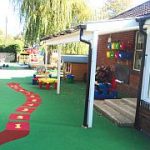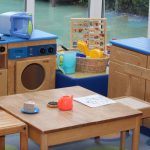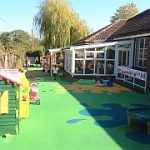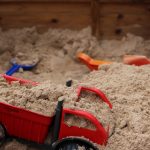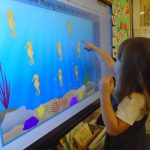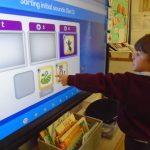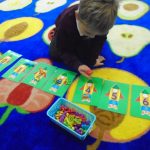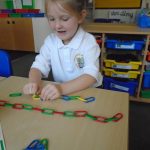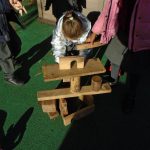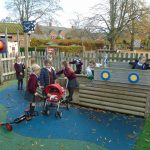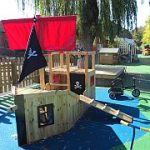A warm welcome to Reception’s class page. Here you will find lots of information about our weekly routines and details of the exciting learning that takes place both in our classrooms and our outdoor area. We are a large team who work closely together to ensure each child feels supported, happy, engaged and challenged.
The 3 I’s
At Welwyn St Mary’s the 3 I’s are at the heart of everything we do:
Intent
Our curriculum enables all children to progress. Our planning ensures we build on prior learning and that concepts are grasped by all. We have high expectations and encourage participation. Children are taught the skills they need to converse with a partner in order to share their ideas. This encourages children to have confidence to participate as they have had time to talk.
Implementation
“We need to talk so children can listen and listen so children can talk” Anon
We implement the curriculum through our teaching with adult directed sessions and Child Initiated Learning (CIL). The CIL plans show provision in our indoor and outdoor environments to enable the children to access learning. Adults support this learning and move children on through targeted questions, modelling and support. In adult directed activities, we ask questions that encourage the children to deepen their knowledge, skills and understanding. They are given time to talk to develop further too as they can share ideas with a peer.
Impact
We assess at Baseline and at the end of each term. Children who have not progressed as expected are targeted through small groups or interventions which are specific to each individual child. We assess phonics formally half termly and this feeds into our teaching.
Daily routine
Each day is started with ‘busy fingers’ where children engage in a range of fine motor activities to develop and strengthen the smaller muscles in their hands. This encourages a correct pencil grip for forming letters correctly. Our children learn kinaesthetically through whole class carpet sessions, small group adult-led sessions and child-initiated learning.
- Reception art
Areas of learning
Learning and development covers the 7 key areas of learning within the Early Years Foundation Stage (EYFS). These are:
- PSED Personal, Social and Emotional Development
- CL Communication and Language
- PD Physical Development
- M Mathematics
- L Literacy
- UtW Understanding the World
- EAD Expressive Arts and Creative Development
- Reception playground
- Make believe is fun!
- Reception playground
- Our sandpit.
Classrooms
Both Reception classes are bright, welcoming, and enriched with resources. They allow children easy access to the seven areas of learning during their self-directed play. Within both classes there are the following areas:
Maths area – with resources linked to number, shape and measure.
Literacy area – with resources linked to phonics and mark-making opportunities.
Creative area – with a range of resources and tools for children to develop their creativity. These include; paint, clay, glue, scissors.
Construction area – where children are encouraged to create and build small worlds using resources such as wooden blocks, popoids, Duplo, Lego and Polydron.
Messy area – where children are encouraged to use their senses to explore materials such as play dough, foam, jelly and gloop (cornflour and water).
Role-play area – this is a large room which joins both classes together. It is linked to our current topic and encourages children to act out experiences, develop their story-telling skills and use rich vocabulary.
Investigation area – for children to make observations about the world around them and test out ideas that they may have. For example, what objects in the class are magnetic? Which ones are not magnetic? How do you know?
Small world area – where children are encouraged to use their imaginations and create both every day and fantasy worlds. For example, emergency services, space and enchanted worlds.
Outdoor area
Reception children have daily access to the outdoor area whatever the weather! Included outdoors is;
Water area – an open-ended activity which provides our children with opportunities to make discoveries and explore outcomes. Resources include; pipes, buckets, boats, sieves.
Mud kitchen – to encourage messy play, sharing and turn-taking.
Sand pit – to promote large muscle skills by digging, scooping, pouring and sifting.
Construction area – for children to create large scale models with crates, blocks and bricks.
Football pitch – with 2 goal posts for children to run, kick and learn team sport.
Adventure area – which includes a pirate ship for imaginative play!
Mark making area – with a large chalk board and easel for painting.
- Reception. Building blocks
- Reception playground
- Reception pirate ship
Reading
“You can find magic wherever you look, sit back and relax all you need is a book!” Dr Seuss
Children are encouraged to read at any and every opportunity. In Reception, children read during whole class learning (daily), as part of a group in guided reading sessions (weekly) and one-to-one with an adult (at least weekly). Books are changed and sent home twice a week and we ask parents to also read with their children daily.
“Three year olds who are read to on a less than weekly basis are around 4 months behind their peers who are read to more often”.
Top tips for reading at home:
- Read with your child for 10 minutes every day. This can be done at any time of the day and not just bedtime.
- Discuss what you can see. What characters can you see? What is happening in the illustrations? Why do you think this is?
- Make predictions about what you think might happen next? Were you correct?
- Make up alternative endings to the story.
- Ask questions about the story? Who, what, why, when, where?
- Can your child re-tell the story in their own words? Can they say a beginning, middle and end?
- Can you add different voices for different characters?
- Can you spot repeated words/phrases?
- Chat, play, read.
- Keep it short and keep it fun!
“Parents and carers reading daily with their child in the early years can have a significant impact on later academic ability”
Using synthetic phonics to teach reading at school encourages your child to sound out words. However, not all of the words they will meet can be sounded out. These are called ‘tricky words’.
We have 30 sets of flashcards which contain tricky words and teach these alongside synthetic phonics. Children are given these flashcards to practise reading at home and we encourage parents to do this at home alongside reading stories with your child.
Weekly letters
Each week we send a letter to parents to inform them of what skills and knowledge their children have learnt that week and we also include ideas for you to reinforce or enhance these.
Behaviour and attitudes
We use a positive approach to behaviour through Hertfordshire Steps. Children are praised for their efforts and achievements and we see that this has a positive impact on the children’s learning and behaviour. All staff have high expectations of the children and this is demonstrated by behaviour choices. The children understand the rules and follow these, showing that they have high expectations of themselves. Both classes promote calmness and safety. We encourage children to walk around school for safety and to use soft voices when indoors.
The children understand what bullying is and that this is unacceptable. We ensure that all children are given a voice and time to talk to ensure they feel safe to share worries with adults.
Badges
To further enforce positive behaviour choices, each Friday we award badges:
‘A’ badge for something good that your child has achieved.
‘E’ badge for a task into which they put lots of effort.
‘K’ badge for an act of kindness.
‘V’ badge is for a child showing our current value.
Golden Book
Children may be nominated by adults or their peers for a place in the school’s Golden Book. Nominations for the Golden Book are announced in class each Friday and recognised on our website. Children are awarded a certificate from Mrs Westley informing parents that this has happened. We encourage parents to ask their children what they have done to merit this award and make a special thing of it at home.
Termly leaflets
- Reception Summer Term Leaflet 2025 (486.96KB)
- Pie Corbett reading spine books (72.38KB)
- EYFS Phonics Progression of Skills (533.24KB)
- Reading record guidance (327.61KB)
- Reception Curriculum Map (180.38KB)
Useful websites:
- oxfordowl.co.uk – free e-books if you set up a log in
- phonicsplay.co.uk www.letters-and-sounds.com
- purplemash.com – school will provide log in details
- topmarks.co.uk
- nrich.maths.org
- Phase 2 phonics – https://www.bbc.co.uk/bitesize/topics/zf2yf4j
- Geraldine the giraffe on YouTube. E.g. – https://www.youtube.com/watch?v=sUmUpf-JNoU
- ictgames.com – phonics and maths games
- Alphablocks – https://www.bbc.co.uk/cbeebies/shows/alphablocks
- Numberblocks – https://www.bbc.co.uk/cbeebies/shows/numberblocks
- https://readingeggs.co.uk/ (30 day free trial)
- teachyourmonstertoread.com – free when used on a computer. There is an app available too which does require payment. Set up a free log in to use on a computer.
- phonicsbloom.com – a range of free phonics games
